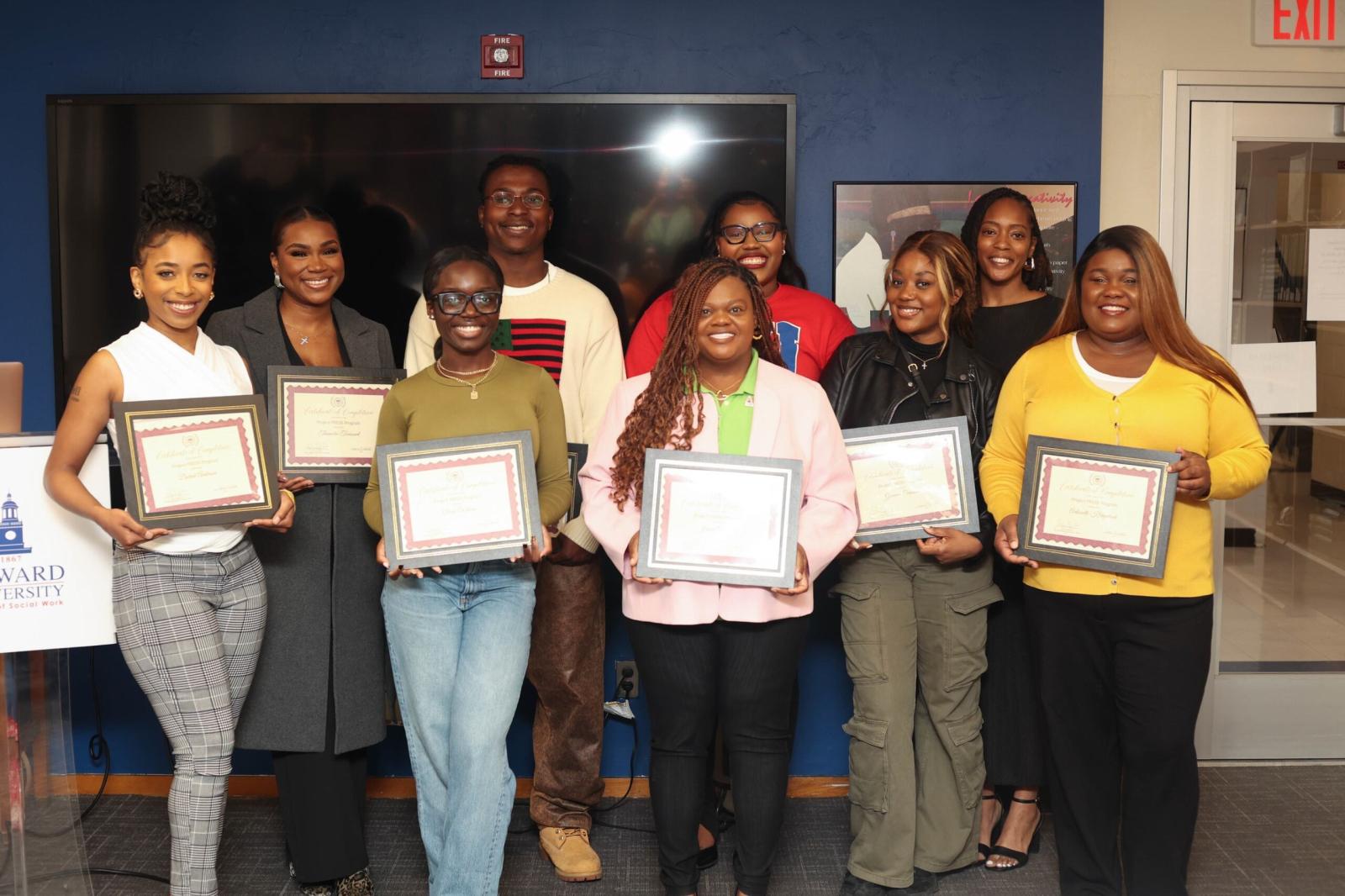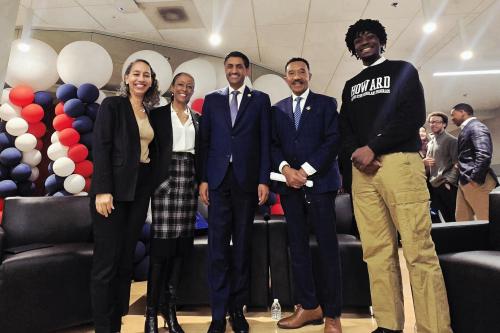In 2023, schools in D.C.’s wards 7 and 8 faced an overwhelming mental health crisis. The long-term effects of the pandemic — the isolation, loneliness, disruption to daily life, and possibility of having to learn in an unstable home environment — along with the everyday stressors of racism and poverty, only exacerbated the mental health risks students already faced. Like the rest of the city (and the country), these wards lacked the school social workers necessary to provide long-term, sustainable interventions for the most vulnerable students. In 2023, for example, there were 97 vacancies, according to Dr. Sandra Jeter, an assistant professor in Howard's School of Social Work.
“Mental health among our young people, especially Black youth, became a lot worse,” says Jeter. “It was definitely a crisis nationwide. Even when we came back to school, we recognized there was an even worse shortage.”
To directly tackle the problem, Howard University students began serving as social workers under a pilot program launched and managed by Jeter. Named Project PRESS (Preparing Responsive and Effective School Social Workers), the federally funded program places students working to earn a Master of Social Work degree in schools to train as school social workers for one year, with the ultimate goal of having them take on permanent positions in schools across the city.
Fellows in the program undergo two weeks of intensive training before being placed in a school and continue to receive training and feedback throughout the year while working directly with students and teachers. Their training focuses on cultural sensitivity and responsiveness to the needs of Black students and families using the Engaging, Managing, and Bonding through Race (EMBRace) socialization method, and an understanding of how trauma and stress affect not only the youth they work with but also themselves as social workers.
“Our trainees are taught to honor the lived experiences of the students and of the families in the community,” explains Jeter. “We emphasize really understanding the whole student individually and where they come from and how that all impacts how they show up in the school system. That’s really what social work is grounded in.”

Lifelong Impacts
The success of Project PRESS has been undeniable. Across the partnering schools, fellows have not only provided individual and group counseling to vulnerable students but also kickstarted sustainable initiatives that support both children and educators. These far-ranging initiatives include an attendance intervention program to fight truancy, community organizations to bring in desperately needed school supplies, a support group for teen mothers and those experiencing teen pregnancy, and a group for boys to talk about regulating their emotions and thinking about their future.
As for the trainees, 100% intend to continue working in school social work, and 60% of the first cohort went on to continue working specifically in D.C., reflecting the deep personal commitment to the community that Project PRESS instills.
"When I hear from my student supervisors about the impact that they’re making in students’ lives — whether that’s one student or five students — that’s success to me."
For Jeter, however, the true impact of the program shouldn’t be reduced to just figures and individual program success.
"I think that people measure success sometimes by how many people you intervene with or how much money you receive for a program, or how much money you make or whatever that is,” she said. “But when I hear from my student supervisors about the impact that they’re making in students’ lives — whether that’s one student or five students — that’s success to me. You see students writing letters to our fellows, telling them, ‘You’re the first person that listened to me; I'm so grateful for you,’ and that shows impact.”
A Program Built on Community
The reasons for the school social work shortage are complex. Student loans and the low salary given the intensity of the workload can prevent potential social workers from living a full life, and unstandardized training and certification requirements make it difficult and isolating to develop the specific skills needed, when compared to fields like medical, geriatric, or private practice social work which have more directed training programs.
For Black students, the path is sometimes even more difficult. The pass rate for the licensure exam required to perform social work in D.C. is 45% for Black applicants, compared to 87% for white applicants — an issue that former fellow Kyaus Washington is addressing with Project PRESS, providing testing materials and other resources for program participants.
Project PRESS is unique in providing a clear structure and pathway for students to begin working in schools. Beyond training and educational resources, the program works to ease the financial burden on fellows by covering their final semester’s tuition, as well as providing stipends for travel, supplies, and any interventions they may need to make on behalf of students. Possibly the most important resource, however, is the community within their cohort.
“Your path to graduation is not always a straight line, right?" Jeter explains, sharing that students would study together and be there for each other in times of need. "Some things come up. But our students supported each other so much. One of our students lost a family member and the cohort went to her house, or called her and made sure she was okay, or would cook for her. They’ve really built community, and that community helped them get to the finish line. You can tell that even after they graduate, they’re going to remain close.”
Bringing Love to Your Work
Being a school social worker is a true calling, one that requires enormous dedication. Beyond the demanding workload, serving not only as a counselor but a bridge between students, families, communities, and the resources they need can be mentally and emotionally taxing, and Jeter emphasizes the importance of self-awareness to her trainees.
“Be prepared to get to know yourself a little bit better,” is her advice to those interested in the field. “Know that working with children, working with young people forces you to acknowledge a lot about yourself, even those things — especially those things — that are not always on the surface.”
Along with that self-awareness, however, she emphasizes another important aspect of her work: love.
“We kind of take love out of the professional environment because it’s inappropriate or it makes people look weak when they actually care about something or whatever it is,” Jeter said. “But when you're working with young people especially, you have to bring love and care into your work. You have to be open to letting them in and letting them know who you are and getting to know who they are.”





